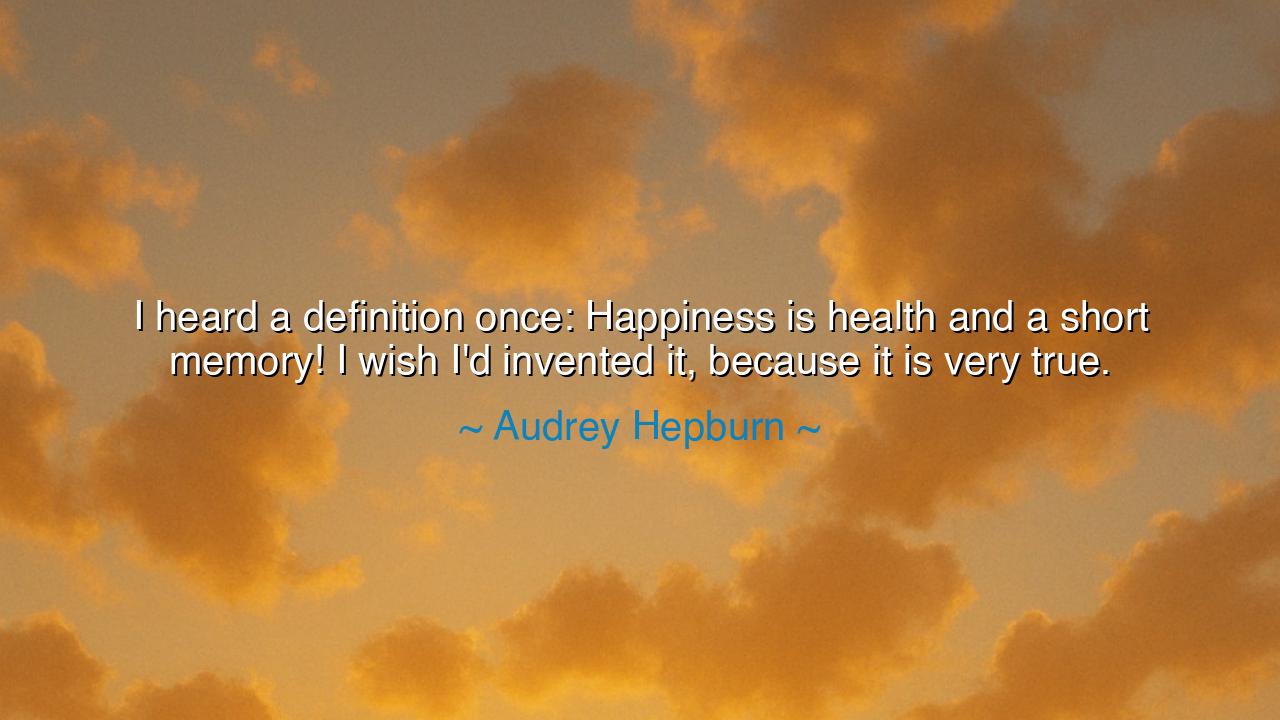
I heard a definition once: Happiness is health and a short
I heard a definition once: Happiness is health and a short memory! I wish I'd invented it, because it is very true.






“I heard a definition once: Happiness is health and a short memory! I wish I’d invented it, because it is very true.” — thus spoke Audrey Hepburn, a woman whose grace illuminated both the screen and the spirit of her time. Though the words were not hers by invention, they were hers by truth. In them, she reveals the essence of happiness not as a grand pursuit of riches or fame, but as something far more humble and eternal: the harmony of health and the mercy of forgetfulness. For to be well in body and free in mind is to walk lightly upon the earth — unburdened by yesterday’s sorrow, ready to receive the quiet joy of today.
The ancients, too, spoke of such wisdom. The Greek physician Hippocrates taught that the body and soul are one — that sickness of the heart can wound the flesh, and peace of mind can heal what medicine cannot. In the same way, Hepburn reminds us that health is not merely the absence of disease, but the presence of vitality — the steady flame of life burning bright within us. It is the vessel through which all joy flows. Without health, the sweetest music falls silent. Without it, the mind, however brilliant, grows weary and dim. Thus, to guard one’s body is to guard the very gate of happiness.
Yet health alone is not enough. For what use is a sound body if the mind is chained to regret? Here Hepburn’s second gift shines forth — the short memory, that blessed forgetfulness that allows the heart to heal. The past, if carried too long, becomes a stone that bends the back of the soul. The wise learn to lay it down. Even nature herself teaches this: the river forgets its course with every bend, and yet flows on toward the sea. The tree sheds its dying leaves each autumn, not in sorrow but in renewal. So too must we learn to forget — not as those who are careless, but as those who understand that peace requires release.
Consider the tale of Nelson Mandela, who after twenty-seven years in captivity emerged not with vengeance, but with forgiveness. His body was frail, but his spirit was strong, for he had learned the sacred art of forgetting what must be forgotten. He once said that to hold on to hatred is like drinking poison and expecting your enemy to die. In letting go, he freed not only himself, but his nation. In this, we see Hepburn’s truth embodied: health of the spirit, joined with forgetfulness of pain, creates a happiness that cannot be taken by circumstance.
Hepburn herself knew this deeply. She lived through war, hunger, and loss, yet she radiated warmth wherever she went. Her laughter was not the sound of ignorance, but of resilience — the courage to live without being crushed by memory. She understood that happiness is not the perfection of life, but the acceptance of its imperfection. It is not found in possession, but in peace; not in remembering every wrong, but in remembering enough love to move forward.
The lesson, then, is simple and profound: cherish your health, and guard it with reverence. Treat your body as the temple of your spirit — feed it with care, rest it with gratitude, and move it with joy. But also, tend to the mind. Do not dwell on the wounds of yesterday, nor endlessly replay the losses that cannot be undone. Forgive others quickly. Forgive yourself more quickly still. To forget is not weakness — it is wisdom. It is the way the heart renews itself, just as the dawn renews the sky each morning.
So, children of tomorrow, when you seek happiness, do not chase it across the earth as if it were hidden in distant lands. It lies already within you — in your health, which is the strength to live, and in your short memory, which is the grace to let go. Be well, and forget often. Laugh freely, eat with gratitude, rest without guilt. And when sorrow comes, as it always will, let it stay only long enough to teach — then bid it farewell. For happiness, like sunlight, returns most readily to the hearts that do not cling to shadows.






AAdministratorAdministrator
Welcome, honored guests. Please leave a comment, we will respond soon